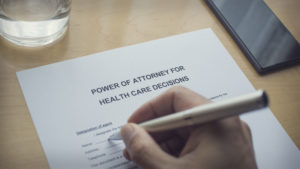
Covid-19 has brought many health care questions to the forefront, including discussions about whether or not someone should be vaccinated. If you’re the health care representative or legal guardian for an incapacitated parent, you may be wondering how your authority should be exercised with regard to the Covid-19 vaccine.
Remember that you are obligated to make decisions based on your parent’s previously expressed wishes and values, not what either you – or their physician – thinks is best, Norris McLaughlin writes in the National Law Review. Needless to say, if Mom or Dad is capable of being involved in the decision-making process, you must consult them, giving them a simple, plain language explanation of the risks and benefits. If not, consider what you know to be their values on medical intervention.
The operative legal principle here? The substituted judgment standard.
Guardianship and Healthcare Power of Attorney – Take a moment to understand the difference….
A healthcare power of attorney and a guardianship are both legal tools that allow someone to act in your stead should you become incapacitated and unable to make decisions for yourself. The big difference is this: A legally capable person chooses a representative (through a durable healthcare power of attorney) to act for them in case they later lose the capacity to decide for themselves. But a court may create a guardianship after the fact for a person who has not named a representative and now is unable to make decisions.
At Geyer Law, we recommend that every client, while they are in sound health, name a guardian in advance. As elder law attorneys, we wanted to share the McLaughlin article because, while it focuses on COVID-19 vaccinations, the pandemic is shining a spotlight on the general issue of medical decisions being made on behalf of elders.
More important information about COVID-19 and vaccinations:
- While (as of current law) facilities cannot force anyone to consent to vaccination, a patient or healthcare facility resident who has not been vaccinated might be isolated or even transferred from that facility.
- Immunity is not immediate, and safety protocols should continue to be followed even after vaccination.
The National Guardianship Association, working in cooperation with the American Bar Association Commission, realizes that guardians have questions about how the pandemic is impacting their responsibilities. “While the rights your loved one has as a person with a guardian have not changed, the pandemic makes it more difficult to exercise certain rights such as visits by family or friends.” On the other hand, the statement makes clear, health care professionals must ensure the patient (or guardian) maintains the ability to participate in treatment decisions.

